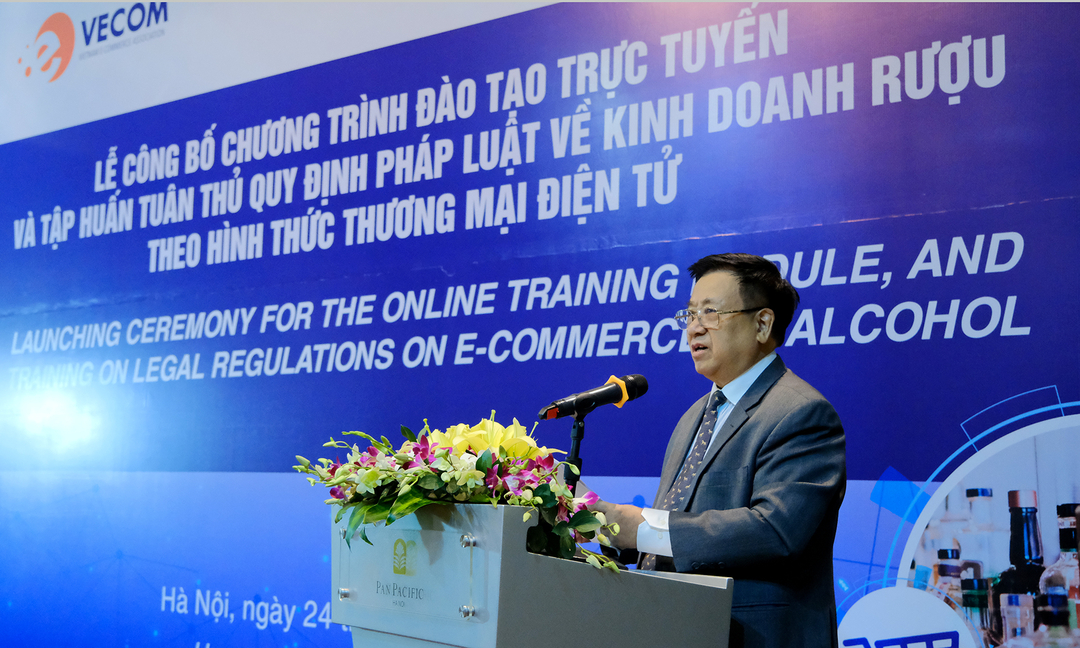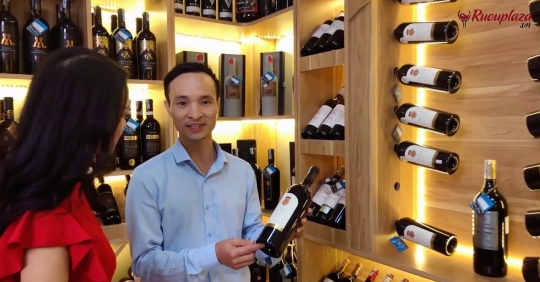
Mr. Nguyen Van Viet, Chairman of the Vietnam Beer – Alcohol – Beverage Association (VBA) gave the opening speech.
In 2019, the National Assembly passed the Alcohol Harm Prevention Act. At the same time, Decree 24/2020/ND-CP was issued, which allows and directs the business of alcohol in the form of e-commerce, along with regulations to ensure legal alcohol business.
“This is both an opportunity and a challenge for companies and retailers in the alcoholic beverages industry as the above regulations help to expand business channels while obliging companies to actively inform themselves about legal compliance,” said Mr. Nguyen Van Viet , Chairman of Vietnam Beer – Alcohol – Beverage Association (VBA) at the Announcement Ceremony of Online Training Program and E-Commerce Alcohol Business Law Compliance Training.
According to Mr. Viet, the aim of the activity on November 24 is to support the relevant authorities in strengthening the management of the alcohol business, including e-commerce, while helping alcohol dealers to comply with the law.
In recent years, shopping through e-commerce websites has become a consumer trend, bringing benefits to both consumers and sellers. In view of this trend, the PLA is committed to actively participating in policy development while protecting the legitimate interests of enterprises, creating a favorable business environment and improving the mechanism for promoting state budget revenue.
“We have, are and will conduct many training and communication activities to raise public awareness on preventing the harmful effects of alcohol abuse and promoting the circular economy for sustainable development,” emphasized Mr. Viet.

The training session attracted the attention and participation of hundreds of delegates.
In Vietnam, the alcohol business is a conditional business. As of 2012 and earlier, the sale of alcohol over the internet is banned. On September 14, 2017, the government relaxed the rule that selling alcohol with an alcohol content of 15 degrees or more over the Internet is considered an infringement.
From January 1, 2020, when the Alcohol Harm Prevention and Control Act 2019 comes into force, the sale of alcohol and beer in the form of e-commerce will be managed according to the terms. At the same time, the ban on the sale of alcohol with an alcohol content of 15 degrees or more was abolished.
At the event organized by VBA in collaboration with the Vietnam E-Commerce Association (VECOM) and the International Wine Business Alliance in Asia-Pacific (APISWA), Mr. Nguyen Anh Son, Director of the Legal Department of the Ministry of Industry and Commerce, received 130 Requests for notification, registration of websites and e-commerce applications that sell alcohol and has approved 40 requests.
In addition to the requirements of standards, technical regulations, product quality, commodity and food safety, Mr. Son emphasized Article 6 of Decree 24/2020/ND-CP. Accordingly, organizations and individuals sell alcohol and beer in the form of e-commerce; Organizations and individuals that provide e-commerce services for the alcohol and beer trade must take steps to prevent persons under the age of 18 from accessing, accessing, searching for information and purchasing alcohol and beer.
“We must take preventive measures and clearly identify the people who can access alcohol and beer through e-commerce. However, in some practical situations such as the father’s order and the child’s delivery of the goods, we still find it difficult to receive the goods at the control stage,” said Mr. Sohn.

Mr. Nguyen Anh Son, director of the legal department of the Ministry of Industry and Commerce, reported some difficulties in managing alcohol business on an e-commerce platform.
After Covid-19, the number of new online consumers continued to increase, according to Doan Quoc Tam, head of the cooperation department of the E-Commerce Association (VECOM). This target group dominates online shopping, even a part of it is prioritized more than traditional shopping.
From a supplier perspective, merchants have implemented many activities related to digital transformation to adapt to the pandemic and prepare for business operations in the post-epidemic “new normal”.
For beer and wine products, VECOM representatives recommend companies to avoid legal risks due to violations when doing business online. Particular attention must be paid to labels, packaging and documents accompanying the goods; Goods origin documents, contracts, purchase and sales invoices, customs declarations; Documents proving legal ownership of goods.
“Retailers need a license if they want to sell alcohol online and increase community engagement,” Tam said.

